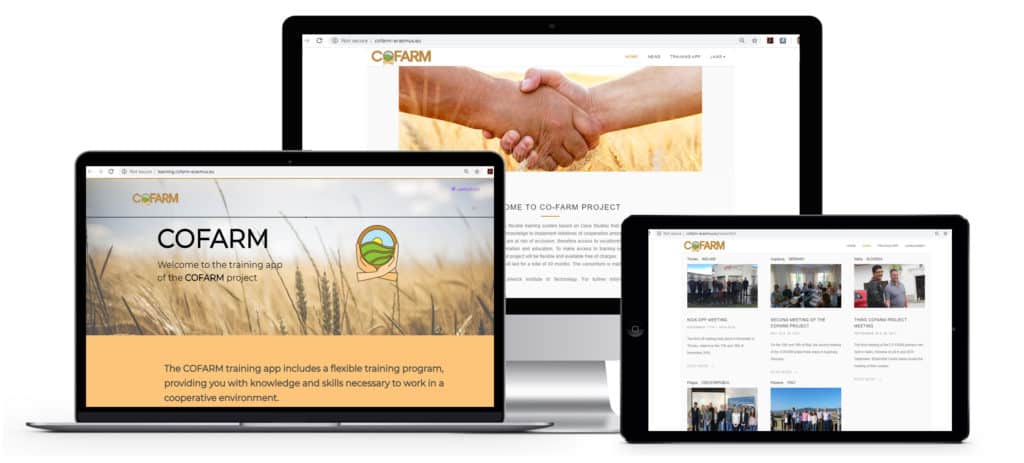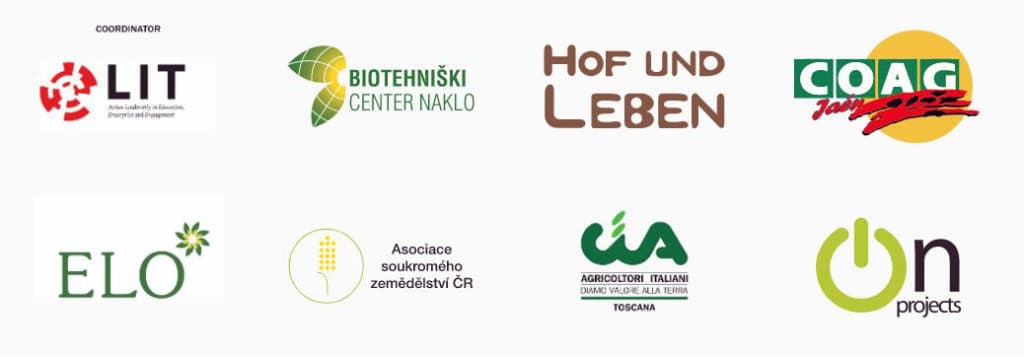
The CO-FARM training app provides a training program aiming to develop the knowledge and skills necessary to work in a cooperative environment. The online training programme is designed to be flexible, which can be accessed at any time. It is also free to participate in. The programme includes a number of resources providing information on cooperation in farming. This includes training modules, a report assessing cooperation in farming across seven European countries and 40 case studies demonstrating the diverse range of possibilities for agricultural cooperation in practice. CO-FARM also highlights that training is important in supporting farming entrepreneurs to get involved in and benefit from cooperative initiatives. But this is one part of a wider environment that can facilitate the development and emergence of cooperative farming initiatives, such as policy and wider supports. Limerick Institute of Technology (LIT) is the coordinator of the project.

The CO-FARM website can be found here: www.cofarm-erasmus.eu/
CO-FARM Project Context
The CO-FARM project identified that co-operation amongst farming entrepreneurs offers an opportunity to address some of the issues facing the agricultural sector. Cooperative farming initiatives have been shown for example to help farming entrepreneurs improve competitiveness, reach new markets and gain innovative knowledge. Cooperatives can help farmers to come together to gain critical mass and get involved in activities that might not be feasible alone. For example, this could involve selling produce direct to consumers, removing intermediaries and capturing more economic value for producers. Another example could involve processing commodity farm products for sale using costly equipment and specialist skills that farmers could not access alone.
However, understanding the potential benefits of cooperation is not always enough to result in cooperation amongst farming entrepreneurs. Cooperation has many strengths in theory, but in practice can be complex to achieve, involving legal, financial and management expertise. CO-FARM identified that skills development is important to develop and effectively work together in a cooperative initiative. CO-FARM also identified that developing the entrepreneurial skills of farmers is a wider challenge facing the agriculture sector.
To work to address these issues, the CO-FARM project developed a flexible, web-based training system. A key part of the training is case studies. These help to provide rural entrepreneurs, rural landowners and farmers with practice-based skills and knowledge to implement cooperation initiatives.
CO-FARM Project Objectives
- Develop a flexible, online training system based on case studies to provide rural entrepreneurs, rural landowners and farmers with the skills and knowledge to implement initiatives of cooperation amongst farming entrepreneurs.
- Apply the Open Educational Resources (OER) approach to develop an online training system which allows for the free use of training resources and re-purposing by others.
- Promote access to and learning using digital, flexible methods aiming to reach audiences considered to be of disadvantaged backgrounds.
- Work to address the challenges of developing the entrepreneurial skills of farmers and need for education and training for farmers of all types.
CO-FARM Project Activities
The CO-FARM project involves eight partners from Ireland, Germany, Spain, Slovenia, Czech Republic, Italy and Belgium. Over 30 months, from November 2016 to May 2019 the project partners have worked together to research, plan and develop a needs-based online cooperative training programme.
First, an evidence base was built to inform the development of the training modules. To identify key topics where knowledge and information was needed the CO-FARM project partners conducted research producing six national reports. This included information on agriculture and cooperatives nationally, benefits and challenges of cooperation, mechanisms to support cooperation and training needs. The evidence was brought together, and final wide-ranging list of training needs required by both farmers and farm advisors was drawn up. Training needs identified included:
- Knowledge development around the benefits of and opportunities for cooperation
- Training on cooperative structures and functions
- Requirements and responsibilities of those involved (incorporating legal, economic, financial, administration, health and safety, marketing, technical and management aspects)
Across the CO-FARM partner countries, case studies demonstrating cooperation initiatives amongst farming entrepreneurs were also developed. This involved interviews and wider stakeholder engagement to collect key information.
This information all fed into the development of content for a web-based training app. It has been designed to offer a flexible means to engage with the training content, allowing users to gain an overview or engage deeply with the content. Users can then select which content is more relevant to them, which could be all or just some of the modules or case studies. It is also designed to accommodate both individuals and groups.
CO-FARM Project Results
The CO-FARM project has developed a free training app providing a flexible training programme focused on co-operation amongst farming entrepreneurs. It is composed of three main components which are a summary report, four modules and a case study database.
The summary report provides information that serves to provide context and motivation. It assesses the extent and importance of cooperation in farming. It finds that while cooperation amongst farming entrepreneurs takes a variety of forms, potential also exists for increased cooperative activity. It identifies a range of benefits of cooperation in farming. This includes better market access through collective purchasing and marketing, as well as cost reduction through joint purchase of inputs or machinery.
Four training modules provide key information on farm-level cooperation such as core principles, benefits and success factors, alongside practical guidelines for setting up and managing a cooperation partnership.
- Module one focuses on the principles and benefits of cooperation.
- Module two focuses on factors that hinder and support a successful cooperation partnership.
- Module three focuses on the steps to creating a successful cooperation partnership.
- Module four looks at managing disagreement, risk, partnership failure and the creation of a partner exit strategy.
Finally, a database of 40 case studies across the European partner countries provides real world examples of a diverse range of successful cooperative-style organisations in agricultural contexts. This includes more traditional farming sectors such as cattle, sheep, poultry, dairy and cereals, as well as different approaches such as social farming, organic farming, on-farm tourism enterprise and renewable energy.
The CO-FARM training app, available in seven languages (English, German, Spanish, Slovenian, Czech, Italian and French), can be found here: http://learning.cofarm-erasmus.eu/?fbclid=IwAR2CKhAa12gyvDohQ2F-45gWJGA4UVeOYp7MMWGwroZo0hzx5VINEBbWxBE
CO-FARM Project Lessons
The CO-FARM training app is designed to be flexible reducing barriers to participation. However other challenges still exist inhibiting farmer engagement. The CO-FARM report highlights challenges to overcome, such as working with farmers to recognise the training benefits and encourage participation.
A wider issue raised in the CO-FARM report are attitudes towards cooperation in the farming community. Past direct or indirect negative experiences and balancing cooperation and independence can be issues impacting farmer likelihood to get involved in cooperative initiatives. Beyond building skills supporting increased levels of co-operation amongst farming entrepreneurs there are also social and cultural barriers to overcome.
CO-FARM also highlights alongside training, a wider facilitative environment supporting the development and emergence of cooperative farming initiatives is also important. Statutory and private agencies in many countries encourage cooperative activity, however further information, advice and support is required to encourage better engagement among farming entrepreneurs.
CO-FARM Project General Info
| Total project budget | €274,960.00 |
| Duration | November 2016 to May 2019 |
| Funder | Erasmus+ |
| Partner countries | Ireland, Germany, Spain, Slovenia, Czech Republic, Italy and Belgium |
CO-FARM Project Contact Details
| Contact organisation | Limerick Institute of Technology |
| Contact person | Seamus Hoyne & Shane O’Sullivan |
| Contact Email | seamus.hoyne@lit.ie / shane.osullivan@lit.ie |
Further Information on the CO-FARM Project
| Website | www.cofarm-erasmus.eu |
| Additional info sources, links | Twitter: @COFARM_ERASMUS |
| Facebook: www.facebook.com/CoFarmErasmus/ | |
| CO-FARM Training App | http://learning.cofarm-erasmus.eu/ |



